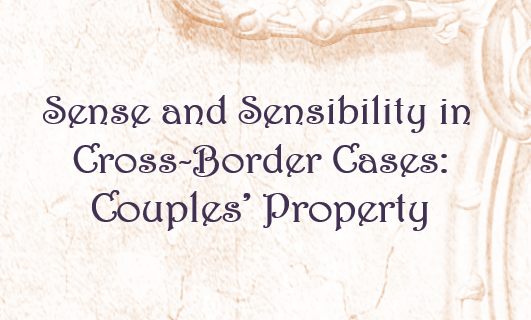Views
Nothing Found
Sorry, no posts matched your criteria
News
The Supreme Court’s Decision in ZF Automotive et al. v. Luxshare, Ltd.: A U.S. Perspective
This is a guest post by Izaak Weaver-Herrera, JD student at the University of Pittsburgh School of Law
Third-party discovery in the United States pursuant to 28 U.S.C. § 1782 has often represented a pragmatic, if contentious, tool for international counsel. However, in a decision this week, the U.S. Supreme Court held that § 1782 discovery may be ordered only if the assembled “foreign or international tribunal” is a body which has been conferred governmental or intergovernmental authority. There has already been a wealth of reaction to this decision, including on this site. This post will offer a few additional perspectives.
As a bit of background, ZF Automotive arrived on the Court’s docket as a consolidation of two cases: ZF Automotive US, Inc., et al. v. Luxshare, Ltd. and Alixpartners, LLP, et al., v. the Fund for Protection of Investor’s Rights in Foreign States. Both cases questioned an open aspect of § 1782’s use: whether the phrase “foreign or international tribunal” included private commercial arbitrations between parties of different States and whether it included arbitral panels assembled pursuant to bilateral investment treaties. The Court ruled that since neither panel was conferred governmental authority, § 1782 discovery would be inappropriate in both instances.
Justice Barrett, writing for a unanimous Court, adopted a textual approach to the question. In other words, this was less of a decision on international policy, and more a reflection of what Congress said and meant. The Court paid particular attention to the use of “foreign” and “international” as modifiers to the word “tribunal.” The latter was more critical than the former. The term “[t]ribunal” has peculiar governmental or sovereign connotations, the Court said, “so ‘foreign tribunal’ more naturally refers to a body belonging to a foreign nation than to a tribunal that is simply located in a foreign nation.” Similarly, the Court found that “international tribunal” under the statute more naturally referred to tribunals between nations, rather than arbitral panels composed of or adjudicating issues between nationals of different States.
The Court also reasoned that this understanding of the statute more uniformly aligned with principles underlying both § 1782’s origin and the Federal Arbitration Act. The express purpose of § 1782 was to foster international comity. An overly broad application of § 1782, the Court’s view, would permit the use of district court resources in furtherance of “purely private bodies adjudicating purely private disputes abroad,” positioning the U.S. court system as a persistent presence in potentially limitless international disputes. The Court’s opinion also recognized the tension such a reading would create between the discovery permitted under the FAA. While the FAA restricts discovery to the discretion of arbitration panels, § 1782 permits both the tribunal itself and any “interested person” to submit requests for discovery. Thus, the Court reasoned, a narrower reading of § 1782 also serves to harmonize the scope of arbitration in the United States.
With these observations, the private arbitral tribunal in ZF Automotive was not a “foreign or international tribunal” under § 1782. This was deemed “straightforward.” The Court found the arbitration panel in the Alixpartners dispute more complicated, but ultimately reached the same conclusion. The opinion noted the BIT “simply references the set of rules that govern the panel’s formation and procedure if an investor chooses that forum,” and therefore did not confer permanent sovereign authority on the ad hoc tribunal. Rather, Lithuania simply consented to an arbitration much in the same way two private entities might. Thus, although the Alixpartners tribunal could render a judgment against Lithuania based on its consent in a treaty, it had not been conferred permanent sovereign authority and could not be considered a “foreign or international tribunal.”
The Court did not “foreclose[] the possibility that sovereigns might imbue an ad hoc arbitration panel with official authority.” So although Mixed Claims Commissions of years’ past didn’t quit analogize to modern BIT tribunals, the Court acknowledged that the former may indeed fall on the permissible side of the Court’s new bright line. As international tribunals keep specializing and proliferating (think of the proposed Multilateral Investment Court, or bodies entrusted to handle international criminal law), future questions as to whether a body is “imbued with governmental authority” will for sure arise—but, of course, private commercial arbitration is clearly outside the bounds of section 1782.
Conference Invitation – “Sense and Sensibility in Cross-Border Cases: Couples’ Property”
The conference Sense and Sensibility in Cross-Border Cases: Couples’ Property will gather line of academic and expert speakers from several countries who will present the results of the research carried out so far under the EU Justice project EU-FamPro dedicated to the EU Twin Regulations (2016/1103 and 2016/1104) in addition to some national topics. Please check the conference programme for details.
The conference will take place on 30 June 2022 in a beautiful venue of the Jean Monnet Inter-University Centre in Opatija (Croatia) and online. The conference is open access without charging any fees, but registration for both onsite and online attendance is required here by 20 June 2022.
The conference is organised by the University of Rijeka, Faculty of Law and the Croatian Comparative Law Association in cooperation with the University of Camerino, the University of Ljubljana, the University of Almeria and the Lithuanian Law Institute.
ABLI-HCCH webinar: Cross-Border Commercial Dispute Resolution – HCCH 2005 Choice of Court and 2019 Judgments Conventions (27 July 2022

Written by Catherine Shen, ABLI
Following a successful collaboration last year, the Asian Business Law Institute (ABLI) and the Permanent Bureau of the Hague Conference on Private International Law (HCCH) are joining hands again for a second joint webinar this year on Wednesday 27 July between 3 to 6pm (Singapore time).
Titled Cross-border Commercial Dispute Resolution – HCCH 2005 Choice of Court and 2019 Judgments Conventions, the webinar will comprise two sessions, each devoted to one of the conventions. Attendees have the option of attending one or both sessions.
Invited speakers Sara Chisholm-Batten (Partner, Michelmores LLP), the Honourable Justice David Goddard (Court of Appeal, New Zealand), Justice Anselmo Reyes, (International Judge, Singapore International Commercial Court), Nish Shetty (Partner, Clifford Chance LLP) and Dr Ning Zhao Senior Legal Officer, HCCH) are expected to talk about the practical operations of the Choice of Court Agreements and Judgments Conventions, how they complement each other and whether the recent debate on the Choice of Court Agreements Convention is justified.
For more information or to register, click here. Early bird discount is available till 26 June. Queries about the webinar can be directed to Catherine at info@abli.asia.



